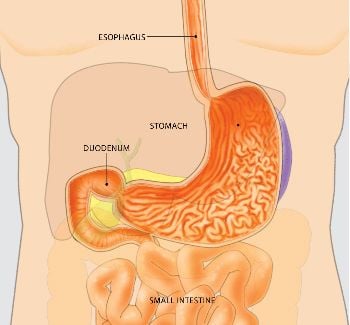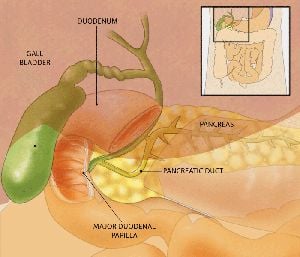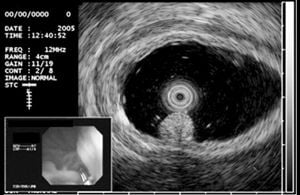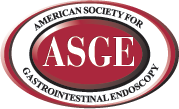This information was developed by the Publications Committee of the American Society for Gastrointestinal Endoscopy (ASGE). For more information about ASGE, visit www.asge.org. This information is intended only to provide general guidance. It does not provide definitive medical advice. It is important
Read more
This information was developed by the Publications Committee of the American Society for Gastrointestinal Endoscopy (ASGE). For more information about ASGE, visit www.asge.org.
This information is intended only to provide general guidance. It does not provide definitive medical advice. It is important that you consult your doctor about your specific condition.
Download this article in PDF format
Don't have Adobe Reader? Download it here
You have been referred to have an endoscopic ultrasonography, or EUS, which will help your doctor evaluate or treat your condition.
 Upper EUS can be used to diagnose conditions of the esophagus, stomach and duodenum.
Upper EUS can be used to diagnose conditions of the esophagus, stomach and duodenum.What is EUS?
Endoscopic ultrasonography (EUS) allows your doctor to examine your esophageal and stomach linings as well as the walls of your upper and lower gastrointestinal tract. The upper tract consists of the esophagus, stomach and duodenum; the lower tract includes your colon and rectum. EUS is also used to study other organs that are near the gastrointestinal tract, including the lungs, liver, gall bladder and pancreas. Endoscopists are highly trained specialists who welcome your questions regarding their credentials, training and experience. Your endoscopist will use a thin, flexible tube called an endoscope that has a built-in miniature ultrasound probe. Your doctor will pass the endoscope through your mouth or anus to the area to be examined. Your doctor then will use the ultrasound to use sound waves to create visual images of the digestive tract.
Why is EUS done?
EUS provides your doctor with more information than other imaging tests by providing detailed images of your digestive tract. Your doctor can use EUS to diagnose certain conditions that may cause abdominal pain or abnormal weight loss. EUS is also used to evaluate known abnormalities, including lumps or lesions, which were detected at a prior endoscopy or were seen on x-ray tests, such as computed tomography (CT) scan. EUS provides a detailed image of the lump or lesion, which can help your doctor determine its origin and help treatment decisions. EUS can be used to diagnose diseases of the pancreas, bile duct and gallbladder when other tests are inconclusive or conflicting.
Why is EUS used for patients with cancer?
EUS helps your doctor determine the extent of the spread of certain cancers of the digestive and respiratory systems. EUS allows your doctor to accurately assess cancer's depth and whether it has spread to adjacent lymph glands or nearby vital structures, such as major blood vessels. In some patients, EUS can be used to obtain a needle biopsy of a lump or lesion to help your doctor determine the proper treatment.
How should I prepare for EUS?
For EUS of the upper gastrointestinal tract, you should have nothing to eat or drink, usually for six hours before the examination. Your doctor will tell you when to start this fasting and whether it is advisable to take your regular prescription medications.
For EUS of the rectum or colon, your doctor will instruct you to either consume a colonic cleansing solution or to follow a clear liquid diet combined with laxatives or enemas prior to the examination. The procedure might have to be rescheduled if you don't follow your doctor's instructions carefully.
 EUS provides more information than other imaging tests by providing detailed images of your digestive tract.
EUS provides more information than other imaging tests by providing detailed images of your digestive tract.What about my current medications or allergies?
You can take most medications as usual until the day of the EUS examination. Tell your doctor about all medications that you're taking and about any allergies you have. Anticoagulant medications (blood thinners such as warfarin or heparin) and clopidogrel may need to be adjusted before the procedure. Insulin also needs to be adjusted on the day of EUS. In general, you can safely take aspirin and non-steroidal anti-inflammatory medications (ibuprofen, naproxen, etc.) before an EUS examination. Check with your doctor in advance regarding these recommendations. Check with your doctor about which medications you should take the morning of the EUS examination, and take only essential medications with a small sip of water. If you have an allergy to latex, you should inform your doctor prior to your test. Patients with latex allergies often require special equipment and may not be able to have a complete EUS examination.
Do I need to take antibiotics?
Antibiotics are not generally required before or after EUS examinations. However, your doctor might prescribe antibiotics if you are having specialized EUS procedures, such as to drain a fluid collection or a cyst using EUS guidance.
Practices vary among doctors, but for an EUS examination of the upper gastrointestinal tract, some endoscopists spray your throat with a local anesthetic before the test begins. Most often you will receive sedatives intravenously to help you relax. You will most likely begin by lying on your left side. After you receive sedatives, your endoscopist will pass the ultrasound endoscope through your mouth, esophagus and stomach into the duodenum. The instrument does not interfere with your ability to breathe. The actual examination generally takes less than 60 minutes. Many do not recall the procedure. Most patients consider it only slightly uncomfortable, and many fall asleep during it. An EUS examination of the lower gastrointestinal tract can often be performed safely and comfortably without medications, but you'll receive a sedative if the examination will be prolonged or if the doctor will examine a significant distance into the colon. You will start by lying on your left side with your back toward the doctor. Most EUS examinations of the rectum generally take less than 45 minutes. You should know that if a needle biopsy of a lesion or drainage of a cyst is performed during the EUS, then the procedure will be longer and may take up to two hours.
 Using an endoscope with a built-in ultrasound probe, your doctor will use sound waves to create visual images of the digestive tract.
Using an endoscope with a built-in ultrasound probe, your doctor will use sound waves to create visual images of the digestive tract.What can I expect during EUS?
What happens after EUS?
If you received sedatives, you will be monitored in the recovery area until most of the sedative medication's effects have worn off. If you had an upper EUS, your throat might be a little sore. You might feel bloated because of the air and water that were introduced during the examination. You'll be able to eat after you leave the procedure area, unless you're instructed otherwise. Your doctor generally can inform you of the preliminary results of the procedure that day, but the results of some tests, including biopsies, may take several days.
Should I arrange for help after the examination?
If you received sedatives, you will not be allowed to drive after the procedure, even if you do not feel tired. You should arrange a ride home in advance. You should also plan to have someone stay with you at home after the examination because the sedatives could affect your judgment and reflexes for the rest of the day.
What are the possible complications of EUS?
Although complications can occur, they are rare when doctors with specialized training and experience perform the EUS examination. Bleeding might occur at a biopsy site, but it's usually minimal and rarely requires follow-up. You might have a slight sore throat for a day or so. Nonprescription anesthetic-type throat lozenges help soothe a sore throat.
Other potential but uncommon risks of EUS include a reaction to the sedatives used, aspiration of stomach contents into your lungs, infection, and complications from heart or lung diseases. One major but very uncommon complication of EUS is perforation. This is a tear through the esophagus, stomach or lining of the intestine that might require surgery to repair. The possibility of complications increases slightly if a needle biopsy is performed during the EUS examination, including an increased risk of pancreatitis or infection. These risks must be balanced against the potential benefits of the procedure and the risks of alternative approaches to the condition.
Download this article in PDF format
Don't have Adobe Reader? Download it here
-
Understanding Endoscopic Ultrasonography
Category: Understanding Endoscopic Ultrasonography
Our Location
Find us on the map
Hours of Operation
Our Regular Schedule
Stephen K. Buto, M.D.
Monday:
9:00 am-12:00 pm
2:00 pm-4:30 pm
Tuesday:
9:00 am-12:00 pm
2:00 pm-4:30 pm
Wednesday:
9:00 am-12:00 pm
Thursday:
9:00 am-12:00 pm
2:00 pm-4:30 pm
Friday:
9:00 am-12:00 pm
2:00 pm-4:30 pm
Saturday:
Closed
Sunday:
Closed

 Since its founding in 1941, the American Society for Gastrointestinal Endoscopy (ASGE) has been dedicated to advancing patient care and digestive health by promoting excellence in gastrointestinal endoscopy. ASGE, with more than 11,000 members worldwide, promotes the highest standards for endoscopic training and practice, fosters endoscopic research, and is the foremost resource for endoscopic education.
Since its founding in 1941, the American Society for Gastrointestinal Endoscopy (ASGE) has been dedicated to advancing patient care and digestive health by promoting excellence in gastrointestinal endoscopy. ASGE, with more than 11,000 members worldwide, promotes the highest standards for endoscopic training and practice, fosters endoscopic research, and is the foremost resource for endoscopic education.